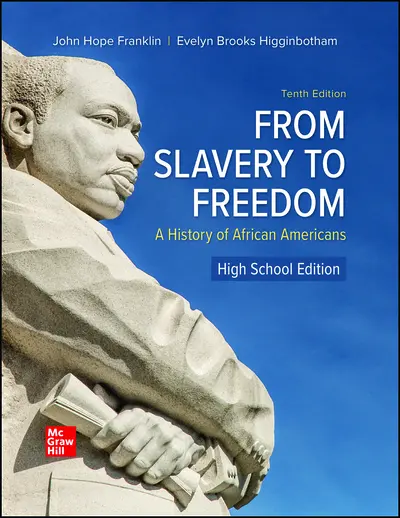John Hope Franklin
John Hope Franklin was the James B. Duke Professor Emeritus of History, and he was Professor of Legal History at Duke University Law School for seven years. A native of Oklahoma and a graduate of Fisk University (1935), he received the A.M. and Ph.D. degrees in History from Harvard University (1936 and 1941). He taught at a number of institutions, including Fisk, St. Augustine’s College, and Howard University. In 1956, he went to Brooklyn College as Chair of the Department of History, and in 1964, he joined the faculty of the University of Chicago, serving as Chair of the Department of History from 1967 to 1970. At Chicago, he was the John Matthews Manly Distinguished Service Professor from 1969 to 1982 when he became Professor Emeritus.
Among his many published works are The Free Negro in North Carolina (1943), Reconstruction after the Civil War (1961), A Southern Odyssey (1971), and perhaps his best-known book, From Slavery to Freedom: A History of African Americans, now in its tenth edition. In 1990, a collection of essays covering a teaching and writing career of fifty years was published as Race and History: Selected Essays, 1938–1988. In 2005, he published his autobiography, Mirror to America.
During his long career, Professor Franklin was active in numerous professional and educational organizations. For many years he served on the editorial board of the Journal of Negro History. He also served as president of the following organizations: The Southern Historical Association, the United Chapters of Phi Beta Kappa, the Organization of American Historians, and the American Historical Association. Dr. Franklin served on many national commissions and delegations, including the National Council on the Humanities, the President’s Advisory Commission on Ambassadorial Appointments, and the United States delegation to the 21st General Conference of UNESCO. In June of 1997, President Clinton appointed him to chair the President’s Advisory Board for the One America initiative.
Professor Franklin was also the recipient of many honors. In 1978 Who’s Who in America selected him as one of eight Americans who have made significant contributions to society. In 1995 he received the first W.E.B. DuBois Award from the Fisk University Alumni Association, the Organization of American Historians’ Award for Outstanding Achievement, the NAACP’s Spingarn Medal. In the same year, President Bill Clinton conferred on Franklin the Presidential Medal of Freedom, the nation’s highest civilian medal. In addition to his many awards, Dr. Franklin received honorary degrees from more than one hundred colleges and universities. John Hope Franklin died on March 25, 2009, at the age of 94 years.
Evelyn Brooks Higginbotham
Evelyn Brooks Higginbotham is the Victor S. Thomas Professor of History and African and African American Studies at Harvard University. She is also the national president of the Association for the Study of African American Life and History (2014 to 2021). The first African American to chair the Department of History at Harvard University, she served in this position from 2018 to 2020. She chaired Harvard’s Department of African and African American Studies from 2006 to 2013. Professor Higginbotham earned a Ph.D. from the University of Rochester in History, an M.A. from Howard University, and a B.A. from the University of Wisconsin–Milwaukee. Before coming to Harvard, she taught in the Department of History at the University of Pennsylvania. Previously she taught on the faculties of the University of Maryland and earlier Dartmouth College. In 2010–2011, she was a visiting professor at the Duke University Law School and had the distinction of being its inaugural John Hope Franklin Professor of American Legal History. She has also been a Visiting Professor at Princeton University and New York University.
Professor Higginbotham’s writings span diverse fields—African American religious history, women’s history, civil rights, constructions of racial and gender identity, electoral politics, and the intersection of theory and history. She is the author of the prize-winning book Righteous Discontent: The Women’s Movement in the Black Baptist Church, 1880–1920 (1993), for which she is especially recognized for conceptualizing “the politics of respectability.” The book was included among The New York Times Book Review’s Notable Books of the Year in 1993 and 1994. She is the co-editor with Henry Louis Gates, Jr., of the multivolume reference work African American National Biography (2008, 2012). As a co-author with John Hope Franklin, she thoroughly revised From Slavery to Freedom in her writing of the ninth and tenth editions.
Professor Higginbotham has received honorary degrees and numerous other honors and awards, most notable of which is the National Humanities Medal presented to her by President Barack Obama at the White House in 2015. She was elected to membership in the American Philosophical Society and the American Academy of Arts and Sciences—the nation’s oldest learned societies. In 2008 she received the Carter G. Woodson Scholars Medallion from the Association for the Study of African American Life and the Legend Award from the National Urban League. In 2020, she was selected to be honored with the Preservation and History Award from the New England Historic Genealogical Society.



















































Social Studies
View all Social Studies Programs
IMPACT (K–5)
Actively Learn (3–12)
New Social Studies (6–12)
Networks (6–12)